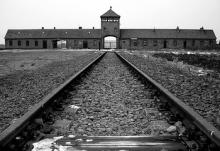Earlier this week, the world commemorated the 65th anniversary of the liberation of Auschwitz. Holocaust survivors, relatives of those who survived and those who perished, politicians, historians and tourists alike all made the trek up to cold, snowy Polish town to remember, reflect and move on.
The wealth of material and media on the Holocaust is astounding. Everything from Schindler's List to The Diary of a Young Girl, from Life is Beautiful to The Pianist, from Carrion Comfort to multitudes of scholarly articles and poems on the Shoah has been read, disseminated, criticized, honored, parodied, enshrined and immortalized. Such is the legacy of the Holocaust - that sixty-five years after its liberation, Auschwitz still commands an unshakeable grasp on the human psyche.
Broadly speaking, nearly nine million people were killed in the Holocaust (Jews, ethnic Poles, Slavs, Russians, the disabled, homosexuals, Jehovah's Witnesses and Freemasons); almost two million of those deaths were at Auschwitz. Thousands, hundreds of thousands, maybe even millions of stories have been recorded; stories from those who worked in the camps, survived the camps, those who escaped, and from those who died within its fences. The accounts have been dramatized into movies, books, poems and plays that have entered the collective human conscious almost as much as concepts like "Auschwitz" and "the Holocaust" themselves have done.
It makes me wonder how we'll remember Auschwitz and the Holocaust, say, ten years from now, for the 75th anniversary of the camp's liberation. Or thirty-five years from now, in 2045, one hundred years after the camp was liberated. By that time, and most (if not all) survivors of the Shoah would have passed on. The museums, the books, the pictures, the articles, and the movies will still exist. The long railroad track leading to the camp's main gate will probably be there; so will the "Arbeit macht frei"sign.
And in 2045, when the last of the survivors have passed on, and "Auschwitz" and "the Holocaust" recede further into history, how will we commemorate Auschwitz then? I imagine there will still be ceremonies and speeches; heads of state pledging to never let the lessons go unlearned; wreaths will be placed and tears will be shed. But of those speeches, none will be from old men and women with a tattoo on their forearm. Recordings of their words will be played, and maybe a child, or a grandchild, will read what they once said. But when we lose that link - when the last Holocaust survivor passes away - we lose a piece of history.
How will we remember the Holocaust when the last survivors die? I'll be discussing that in Part 2.
